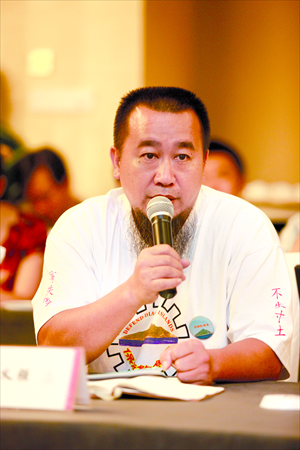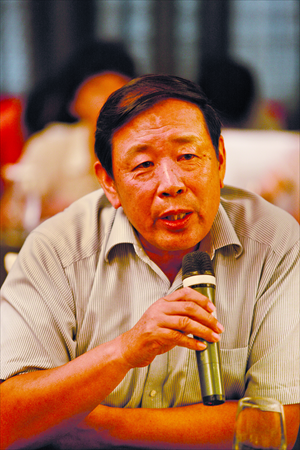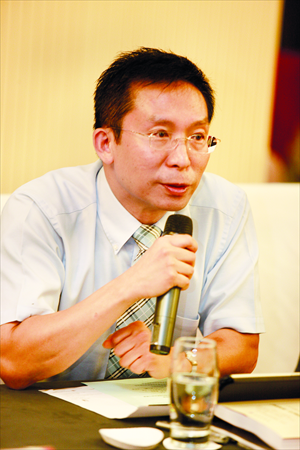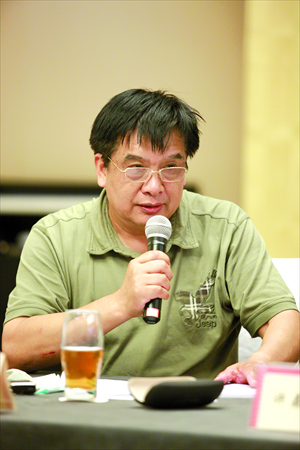Diaoyu impasse calls for new ideas
Tensions over the Diaoyu Islands dispute have escalated since last week, when Japan detained Chinese activists landing on the islands. The activists were later released, but heated discussion continues in China. How should China face up to Japan's provocative actions? What can China do to seize more of an initiative in the complex geopolitical landscape of East Asia? Scholars from the mainland, Hong Kong, Macao and Taiwan gave their thoughts at a symposium on safeguarding the Diaoyu Islands held by the Global Times Sunday.
Trust govt when detained
Li Yiqiang, secretary-general of the World Chinese Alliance in Defense of the Diaoyu Islands

Our latest landing on the Diaoyu Islands was specifically planned, as August 15 was the date the Japanese forces surrendered to the Allied forces during World War II.
The campaign was a big success. Since it had been made public, the Japanese side had already made preparations. However, we still managed to break through the blockade by dozens of Japanese military vessels and successfully landed on the Diaoyu Islands.
Though Chinese activists were detained, they were released within 48 hours. Credit should be given to the Chinese government, as its efforts were the key to the early release.
After the detention, our alliance made a decision that night that we should trust the government's handling of the issue.
Grass-roots campaigns only play a supporting role in the overall efforts concerning the Diaoyu Islands. It is the government that holds the key to the final solution.
Our activists cannot represent the government. However, we can represent public opinion. This will help us attract more attention across the world.
Draw red lines for Japan
Luo Yuan, major general at the PLA Academy of Military Sciences

In terms of determination, China should make red lines for Japan. For example, we should not allow Japanese to land on the Islands or station its army there.
Meanwhile, China must have countermeasures prepared if Japan insists on doing so. We can also turn the Diaoyu Islands into a shooting range for the navy force.
In terms of wisdom, China should have a national marine strategy for the East China Sea and South China Sea, for example, by setting up a marine committee.
China can consider cooperation with Russia and South K
orea. Both countries have claims over disputed islands with Japan.
Meanwhile, a group can be set up to explore the economic potential in the Diaoyu Islands, and a national coast guard team should be established as soon as possible.
Now we are in a passive position in dealing with Japan's provocations. Why can't we take the initiative?

The landing by Chinese activists on the Diaoyu Islands Wednesday has triggered social fervor for protecting the islands, thanks to the prevalence of social media. In 2004, Chinese activists twice visited the islands, but the effect on public opinion was much smaller.
A national consensus among people in the mainland, Hong Kong, Macao and Taiwan, which is long missed, now forms again and overrides previous internal disparities.
For Tokyo, China's deterrence due to its national rise has increased. In 2010, Japan detained Chinese crew for more than two weeks after the collision incident over Diaoyu. But this time Japan released Chinese activists in two days.
China has held for decades the principle of shelving disputes and seeking joint exploration. The government has been tolerant and restrained, which gives it space for resilience. China doesn't boast, but gives a firm response once other claimants take provocative actions.
China should have more practical contingency plans, since maritime disputes are expected to become increasingly fierce in the future.

The latest civilian movement asserting sovereignty over the Diaoyu Islands was held on August 15, which was a great date. Japan promised to maintain peace on the same date 67 years ago.
Safeguarding rights is a political issue. We need to use the law, learn it, apply it, know it, but also go beyond the law.
There should be an approach of combining the diplomatic, administrative, media, official and public means, as well as proper stimulus for civil society.
Without the civilian movements to protect the Diaoyu Islands, we can only rely on diplomatic authorities.
China needs to make full use of international law to protect ourselves and check provocateurs.
Tokyo Governor Shintaro Ishihara claimed he would purchase the Diaoyu Islands, and Japan wants to nationalize and militarize the Diaoyu Islands. Therefore, we have to take a hard and uncompromising attitude.
As a permanent member of the UN Security Council, China can take the initiative to talk with Japan and ask Japan to interpret the definition of inherent territory.
In my 16 years' work of safeguarding the Diaoyu Islands, the attitude of our government has changed. Its stance has shifted from "shelving bilateral disputes and seeking common development" in the 1980s to the current "keeping the disputes open."
Hong Kong activists' action this time is related to the adjustment of the national policy.
Civilian activities asserting sovereignty over the Diaoyu Islands deserve support from the government. We are interpreting the law in our daily activities. The problem hasn't been resolved. In 50 years, it will be the same as if nothing active is being done.
This victory in defending our Diaoyu Islands can be a good opportunity for us to build up our authority over the East China Sea.
We can launch a full-scale media war against the Japanese, for instance, and one of the key issues our media should press the Japanese side on is the independence of the Ryukyu Islands.
We can also accuse the US along the way of violating international legal principles for unilaterally handing the Ryukyu Islands over to the Japanese.
Chinese navy is relatively weak. We have a long coastal line to manage, and our fishery administration vessels and maritime surveillance ships often have to deal with the issues of the Diaoyu Islands and the Nansha Islands one after another.
When our navy pays visits to other countries, we always send out the same ship. Some in the navy thought this might be inappropriate, so they decided to change the ship's name. But people from other countries could still recognize it.
We don't intend to make Japan submit to China's power, but just to make it less provocative. If we really want Japan to behave itself, we should recover the strength we had before the Meiji Restoration (1868-1912).